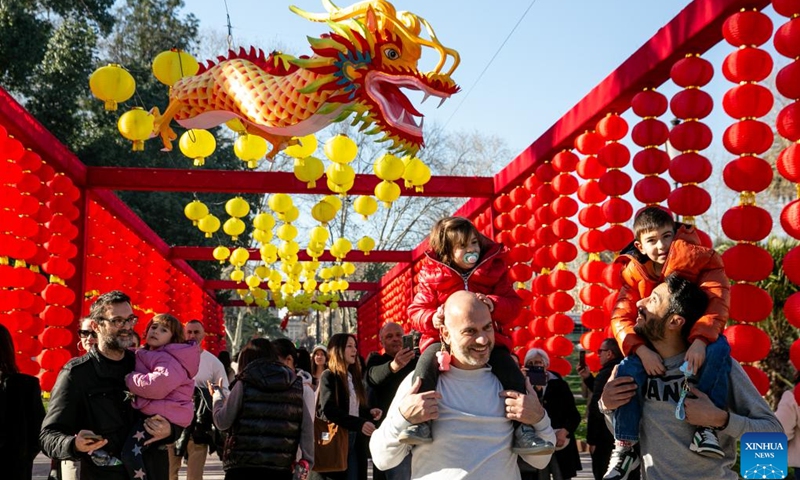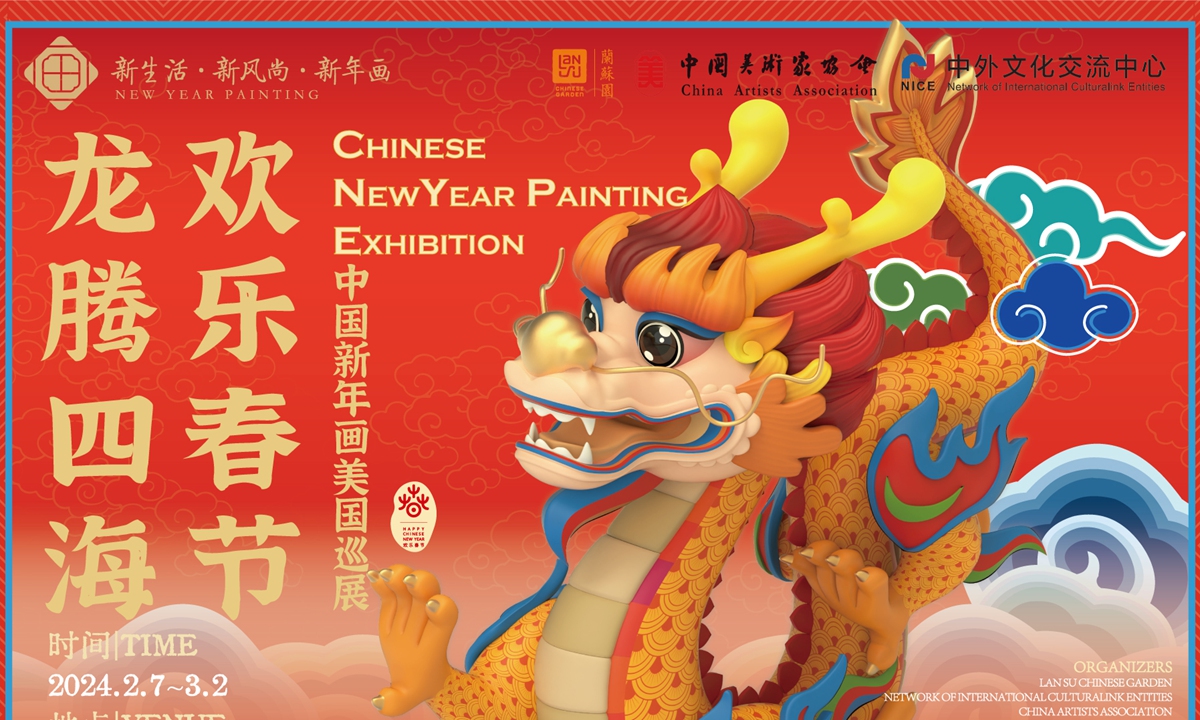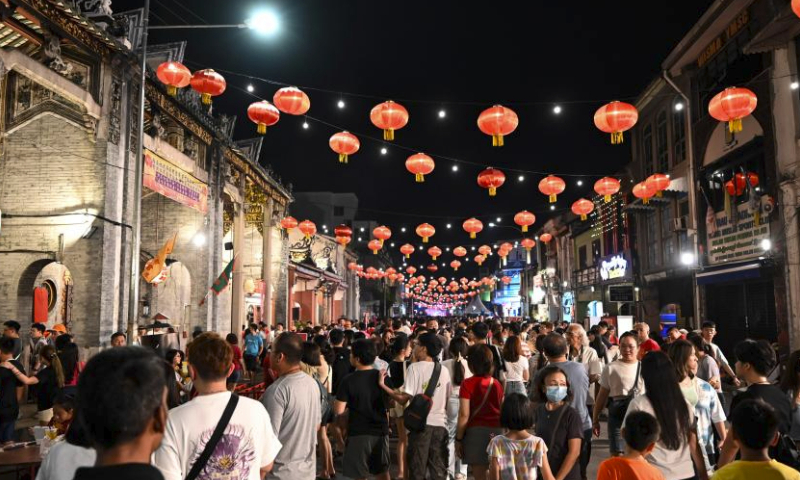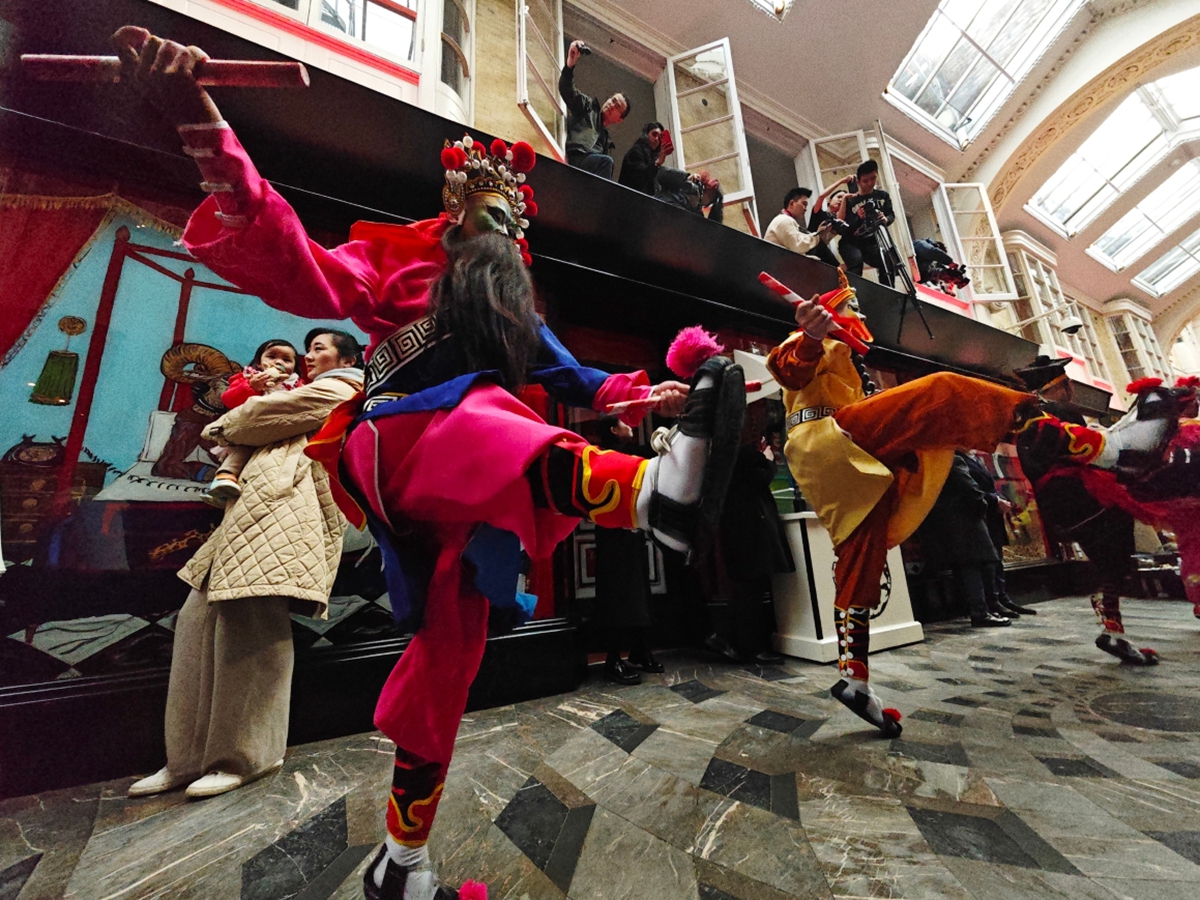
A dancer performs the Yingge dance during Chinese New Year celebrations at London's Burlington Arcade. Photo: Courtesy of Yu Guo, Chinese Embassy in the UK
Editor's Note:
With the worldwide celebration of the Chinese New Year, traditional Chinese cultural forms such as the Yingge dance, or Dance of Heroes, and dragon and lion dances have once again garnered widespread attention, winning hearts of fans overseas as well as the younger generations in China.
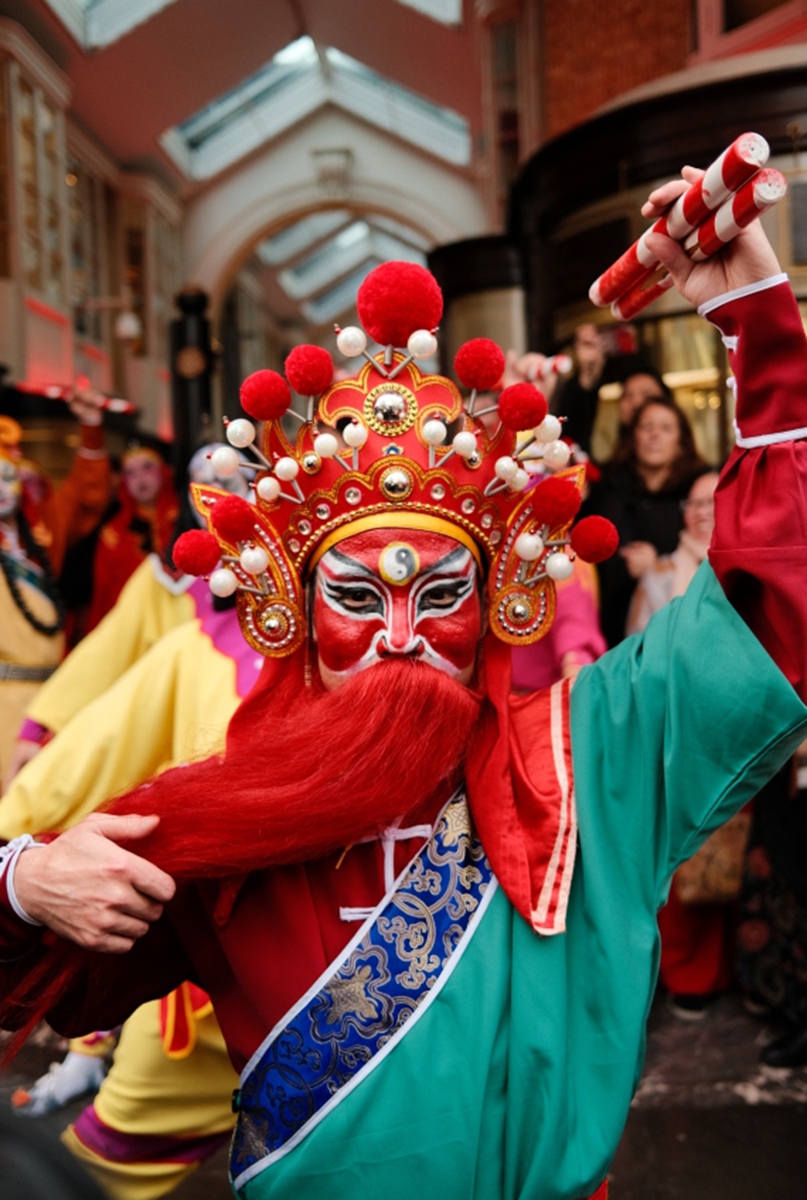
A dancer performs the Yingge dance during Chinese New Year celebrations at London's Burlington Arcade. Photo: Courtesy of Yu Guo, Chinese Embassy in the UK
As a vast country, China is home to diverse cultures. Many folk cultures have emerged and evolved throughout the years, each reflecting the history, traits and society of its place of origin. As the Chinese New Year is increasingly celebrated globally, it has brought its traditional celebrations elsewhere and seen people of other countries join the festivities.During thi Spring Festival, Yingge dance once again swept across social media in China with its powerful, expressive moves and rich history. Video clips of performances have been shared and reposted all over internet with comments such as "This is the most festive performance for the Chinese New Year."
Besides winning praise from Chinese netizens, Yingge dance has also made its way abroad. This Spring Festival, a team of Yingge dancers from South China's Guangdong Province was invited to the UK, bringing an exhilarating performance to London's Burlington Arcade to celebrate the Chinese New Year.
Yingge dance goes abroad
Among many excited spectators, Mark Lord, head beadle of the arcade, said, "We've waited 300 years for the dance troupe to leave China and come to perform in Europe. I have to say, it was well worth the wait."
"Burlington Arcade is a significant landmark in London. To commemorate the Arcade's 205th anniversary, we wanted to celebrate with unique one-of-a-kind surprises throughout the year. The Yingge dance was the perfect partner to kick off our celebrations as its heritage dates back 300 years," said Trupti Shah, commercial director at Burlington Arcade, told the Global Times.
The performance from the Yingge dancers was electrifying and a unique once-in-a-lifetime showcase of Chinese culture brought to London, Shah said.
"Traditional Yingge dance stands as a testament to a rich cultural legacy, boasting a history that spans over 300 years. We were privileged to receive an invitation to showcase our artistry in the UK. It further contributed to a positive image of the Chinese people abroad," said Chen Laifa, a nationally recognized inheritor of Puning Yingge dance and leader of the team of performers.
With their triumphant performance in London, the Yingge dance team amassed valuable experience and remains poised for future invitations from across the globe.
The overarching objective is to contribute to the global recognition and appreciation of Yingge dance and foster a deeper understanding among diverse audiences. As custodians of this cultural heritage at the national level, the performers bear the responsibility of passing down this tradition and actively involving more young people to ensure its continued vibrancy, Chen told the Global Times.
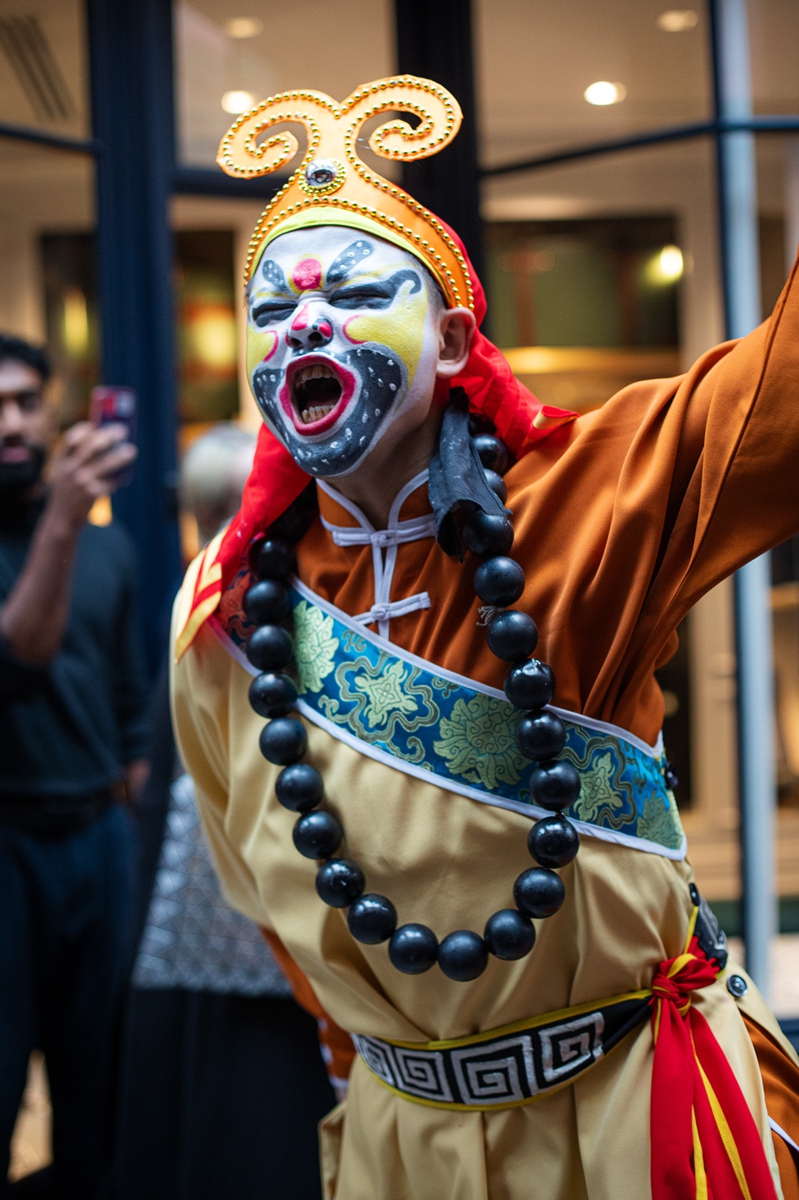
A dancer performs the Yingge dance during Chinese New Year celebrations at London's Burlington Arcade. Photo: Courtesy of Burlington Arcade
Attracting the young generation
From a centuries-old art form to a magnum opus of Chinese tradition worldwide, the popularity of Yingge dance on the streets of London during the Spring Festival was a success in terms of traditional Chinese folk art sailing overseas.
Literally translated as the "Songs of Heroes" dance, Yingge dance is a 300-year-old folk dance that originated from the Chaoshan area of South China's Guangdong Province. Dressed in colorful costumes, performers wave wooden sticks in their hands while dancing in orderly formations to the music.
Based on the stories of the 108 Heroes of Liangshan Mountain from the classic novel Outlaws of the Marsh, this is a folk art combining a variety of forms, from martial arts and Chinese operas to dance.
With its high compatibility with various art forms and years of inheritance and innovation, this Chaoshan-born dance art has spread to neighboring countries and regions in the last century.
Chinese immigrants brought Yingge to Thailand around a century ago, where it took off and expanded to over 10 provinces: In 1942, a Chinese national surnamed Luo arranged a formal Yingge dance performance in Phanat Nikhom for the Mid-Autumn Festival.
Another Chinese citizen, Zhang Keshan, founded a Yingge squad in Nakhon Sawan in 1947. The troupe has participated annually in Mid-Autumn Festival and Chinese New Year celebrations, developing its own legacy in Thailand.
Since 2022, with the backing of institutions and intangible cultural inheritors, performers from both countries have had chances to visit each other.
Deng Yao, a scholar devoted to the intangible cultural heritage of Guangdong, said that with the spread of videos and reports from Chinese media, the dance has also awakened the nostalgia and longing of young people in both Thailand and China who love Yingge.
For now, this traditional Chinese dance is widely known by its inheritance among the younger generation as well as being on the wind of social media.
"Many people from other provinces told me that they drove thousands of kilometers just to see us dance," Chen Xiangyu, a 27-year-old lead dancer in the Puning Yingge dance troupe in Guangdong, told the Global Times.
"As a traditional folk dance widely circulated in the Chaoshan area, Yingge has a broad social base," Chen Danping, director of the Intangible Cultural Heritage Protection Center in Puning, the birthplace of Yingge in Guangdong, told the Global Times. "It is one of the representatives of Cantonese culture. The performance has a core of promoting righteousness, auspiciousness and peace while suppressing evil energies."
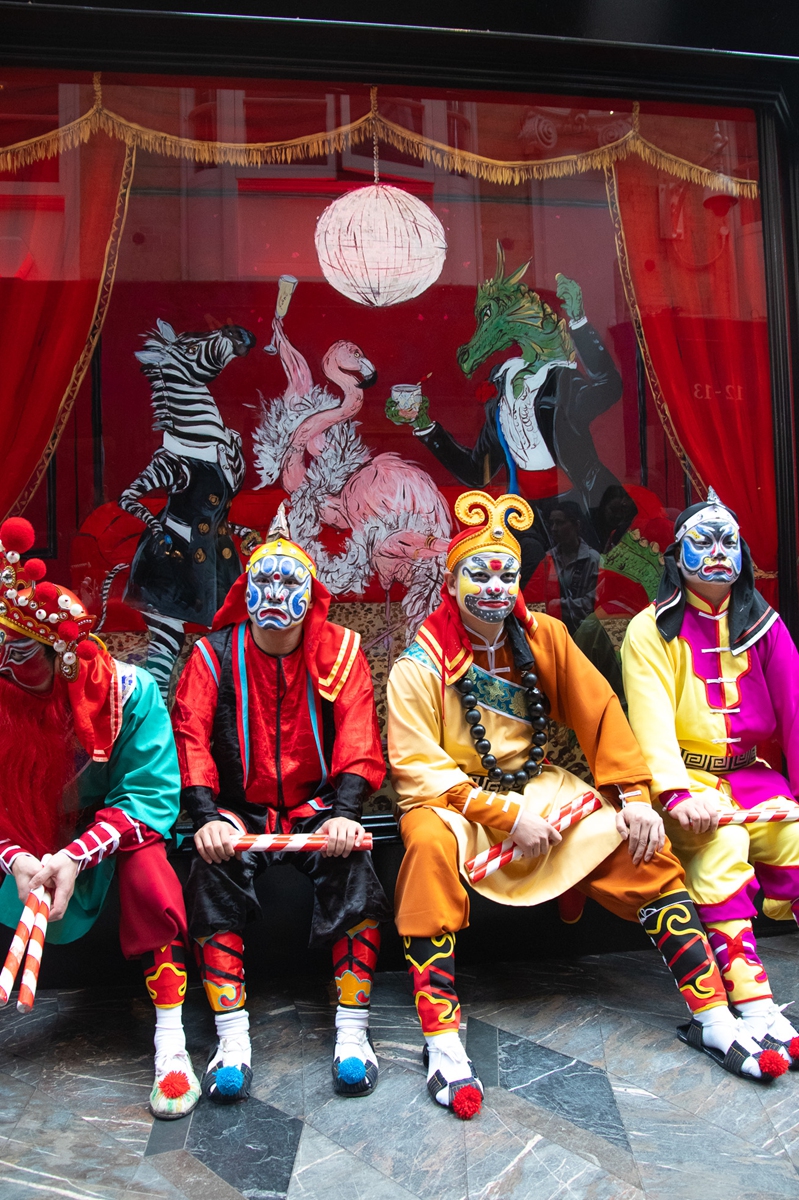
Dancers perform the Yingge dance during Chinese New Year celebrations at London's Burlington Arcade. Photo: Courtesy of Burlington Arcade
A more familiar jewel
Along with Yingge dance, traditional Chinese festive performances with rich histories and culture such as dragon and lion dances have long been familiar to people around the globe.
Days ahead of Chinese New Year, Chinese volleyball star spiker Zhu Ting, who plays for Italian club Savino del Bene Scandicci, was excited to see dragon and lion dance performances during the halftime of an Italian Serie A1 volleyball league game on February 4.
The performers were students from a local martial arts school. The school has gathered a growing number of young Italians who are interested in Chinese culture and have enthusiasm in practicing kung fu, and trying dragon and lion dances, according to the Xinhua News Agency.
The growing popularity of the dances overseas has not come as a surprise to international dragon and lion dance referee Liu Jing, a professor at the School of Martial Arts under the Shanghai University of Sport (SUS).
Liu has a busy schedule around the world, refereeing at international dragon and lion dance competitions and participating in people-to-people cultural exchange events. She has witnessed more and more people, particularly young ones, get involved in this time-honored Chinese folk custom at either professional competitions or as leisure-time activities.
"I can feel their passion and love for the sport," Liu told the Global Times.
At SUS, Liu coaches the university's dragon and lion dance team apart from academic teaching. The team now has some 30 members, most of whom are SUS students majoring in martial arts. Established in 1995, the team has won lots of championships at domestic and international competitions, Liu said.
She added that the university also has an amateur dragon and lion dance club that welcomes students in various majors to come and learn about this sport.
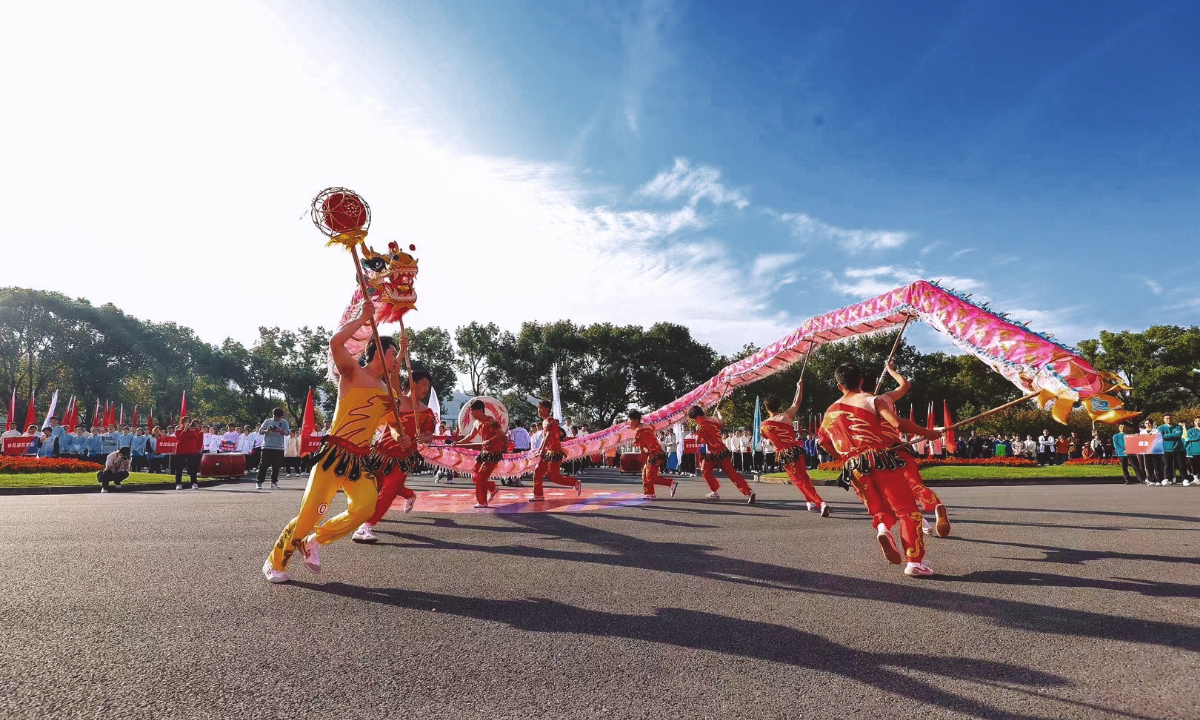
Students of Shanghai University of Sport perform dragon dance. Photo: Courtesy of Liu Jing
An executive member of the Chinese Dragon and Lion Dance Sports Association, Liu said that dragon and lion dances are being popularized among teenagers nationwide with the government's support.
"In Shanghai, as well as regions like provinces of Jiangsu and Guangdong, many secondary and primary schools attend local dragon and lion dance competitions or performances at festivals each year," she exampled.
"It's a very beneficial folk sport that enables young people to build up their bodies, develop teamwork skills and enhance cultural confidence."
Dragon and lion dances have a history of some 4,000 years and 2,000 years, respectively, Liu introduced. Evolving from sacrificial activities at the beginning to festive folk performances later on, the dances have been an important symbol of Chinese culture, she noted.
"Moreover, during the recent decades of development, the dances have gradually entered the arena of competitive sports," Liu told the Global Times.
She shared that at the 15th National Games of China in 2025, dragon and lion dances will become official medal events.
Recife, capital of Pernambuco in northeastern Brazil, established the Spring Festival as official holiday in November 2022. During the Spring Festival of 2023, local government carried out a fabulous light show and various activities to celebrate the holiday. Among them, the lion performance by a group of locals was definitely a highlight.
Fabio Cruz do Nascimento, the team leader, who has been teaching kung fu to local students, established the team. "It was great to bring China's excellent, rich traditions to a country that is so far away and to have the Chinese community here enjoy a holiday just as if they were back at home," he told the Global Times.
Overseas, dragon and lion dances have spread from Chinese communities and attracted more local residents, which is a natural result of the growing popularity and influence of Chinese culture these years, Liu said.
"It's also a vivid embodiment that we live in a global cultural community with a shared future," she said.
"The happiness, auspiciousness and harmony that the dragon and lion dances symbolize are common expectations and pursuits of people around the world. Through people-to-people cultural exchanges, the dances connect us without language barriers."
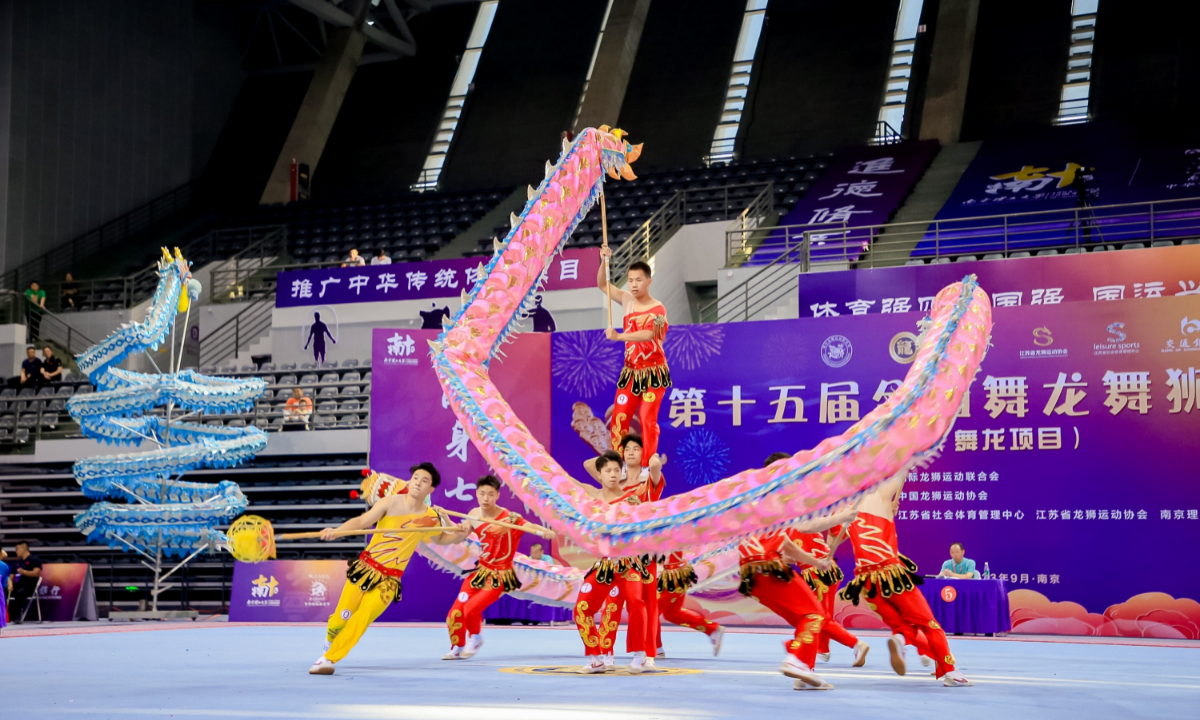
Students of Shanghai University of Sport perform dragon dance. Photo: Courtesy of Liu Jing
